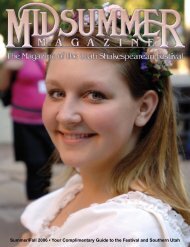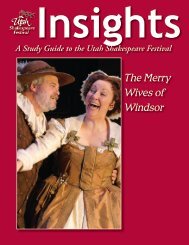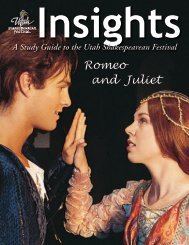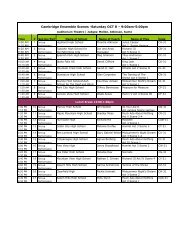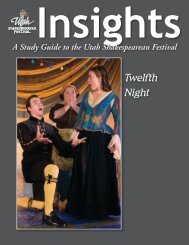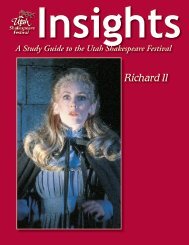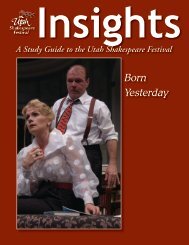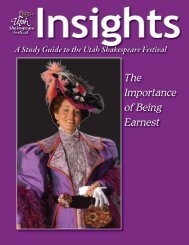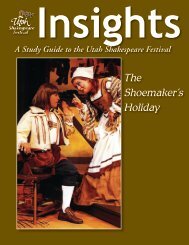The Lion in Winter - Utah Shakespearean Festival
The Lion in Winter - Utah Shakespearean Festival
The Lion in Winter - Utah Shakespearean Festival
You also want an ePaper? Increase the reach of your titles
YUMPU automatically turns print PDFs into web optimized ePapers that Google loves.
10<br />
Filial Rebellion<br />
By Heidi Madsen<br />
“Henry . . . had that goodly household, valiant, wise, and prudent; father of the young k<strong>in</strong>g who<br />
jousted with such ardor; father of Richard the cunn<strong>in</strong>g, who was so wise and shrewd: father of Geoffrey of<br />
Brittany, who likewise was a man of great deeds; and father of John Lackland, because of whom he suffered<br />
much strife and warfare” (Ambrose, L’Estoire de le guerre sa<strong>in</strong>te, cited <strong>in</strong> Amy Kelly, Eleanor of Aquita<strong>in</strong>e<br />
and the Four K<strong>in</strong>gs [Cambridge, Massachusetts: Harvard University Press, 1950], 170).<br />
In James Goldman’s play, <strong>The</strong> <strong>Lion</strong> <strong>in</strong> W<strong>in</strong>ter, it is w<strong>in</strong>ter, 1183; cold implications of an approach<strong>in</strong>g<br />
holiday permeate the air <strong>in</strong> an arguably uncivilized world. Henry II and his wife, Eleanor, are fight<strong>in</strong>g<br />
over which of their three sons should be the next k<strong>in</strong>g: Eleanor wants Richard, Henry wants John, and no<br />
one wants Geoffrey. All three of Henry’s sons either already have or soon will rebel aga<strong>in</strong>st him. Eleanor<br />
has been rebellious too, a crime for which her unforgiv<strong>in</strong>g husband keeps her bricked <strong>in</strong> (that is unless he<br />
needs her diplomatic skills), but she is to be liberated for a Christmas celebration <strong>in</strong> France at the palace of<br />
Ch<strong>in</strong>on.<br />
Peter O’Toole called <strong>The</strong> <strong>Lion</strong> <strong>in</strong> W<strong>in</strong>ter “a witty, literate, modern appreciation of the <strong>in</strong>trigues and<br />
bitchery between Henry II, his wife, Eleanor of Aquita<strong>in</strong>e, and their three sons” (Nicholas Wapshott, Peter<br />
O’Toole [Sevenoaks, Kent: New English Library, 1983], 145), but it is much more. This is a play about<br />
power and control, and it is also a play about family. Henry II needed an “heir to all the k<strong>in</strong>g’s own striv<strong>in</strong>g<br />
and contriv<strong>in</strong>g” (Kelly 171). Children are extensions of their parents, and perhaps this is an assurance<br />
of cont<strong>in</strong>uation; hold<strong>in</strong>g on to the world is <strong>in</strong> this way possible. Soon, however, grow<strong>in</strong>g limbs, grow<strong>in</strong>g<br />
mentalities--<strong>in</strong>dividual ideas and thoughts--extend dist<strong>in</strong>ctly gnarled f<strong>in</strong>gers out <strong>in</strong>to society. Henry probably<br />
could never have anticipated the contention and strife his sons would eventually <strong>in</strong>itiate; but were they<br />
somehow connected to the fact that the boys were his royal-blooded sons?<br />
<strong>The</strong> <strong>Lion</strong> <strong>in</strong> W<strong>in</strong>ter is a play about a royal family tree, its roots <strong>in</strong> all of England and three quarters<br />
of France. Henry’s large doma<strong>in</strong>s were called the Angev<strong>in</strong> empire, s<strong>in</strong>ce the family’s orig<strong>in</strong>al hold<strong>in</strong>g was<br />
the French prov<strong>in</strong>ce of Anjou. Legend, however, would have us believe that their <strong>in</strong>heritance amounted<br />
to more than property: “<strong>The</strong> Counts of Anjou were descended from the Devil, which went some way to<br />
expla<strong>in</strong> their ferocious behavior” (Alfred Duggan, Devil’s Brood [New York: Coward-McCann, Inc., 1957],<br />
ix). Could such a l<strong>in</strong>eage perhaps even condone a somewhat <strong>in</strong>voluntary rapaciousness?<br />
Goldman professed to know the non-fictitious faults of Henry II, Eleanor, and their contumacious sons<br />
(of course, he is more than familiar with those charismatic blemishes of character he himself imag<strong>in</strong>atively<br />
appended); but he loves them regardless (<strong>The</strong> <strong>Lion</strong> <strong>in</strong> W<strong>in</strong>ter [New York: Pengu<strong>in</strong> Books, 1983], vii).<br />
This apparent passion allows one to sit back, fear<strong>in</strong>g noth<strong>in</strong>g, and become <strong>in</strong>timately acqua<strong>in</strong>ted with the<br />
characters, confident <strong>in</strong> Goldman’s astound<strong>in</strong>g loyalty.<br />
How easy would it be to write a play about the real Angev<strong>in</strong>s? Historically, Henry II was “short and<br />
sandy-haired . . . notoriously lecherous” (Duggan 37), a man who supposedly once ate his bedd<strong>in</strong>g <strong>in</strong> a fit<br />
of temper (Duggan 38-39). Richard the <strong>Lion</strong>-Heart has been documented as a “brave, cultivated but cruel<br />
and tempestuous man, dogged by ill-health” ( John Cannon and Ralph Griffiths, <strong>The</strong> Oxford Illustrated<br />
History of the British Monarchy [Oxford: Oxford University Press 1988, repr<strong>in</strong>ted with corrections 1997],<br />
159). However, Goldman’s Richard seems almost naïve—childlike—<strong>in</strong> conversation with his mother, and<br />
with his (supposed) lover, Philip II of France. (<strong>The</strong> fictional Richard may be more worthy of sympathy.)<br />
Geoffrey perhaps was neglected, overlooked, underestimated <strong>in</strong> medieval reality as well as <strong>in</strong> <strong>The</strong> <strong>Lion</strong><br />
<strong>in</strong> W<strong>in</strong>ter. He was not given the same opportunity as his brothers; made duke of Brittany, he was not even<br />
considered for the crown. Nevertheless, he may have been, second only to Eleanor herself, the most <strong>in</strong>sidious<br />
and the most <strong>in</strong>tellectual, <strong>in</strong>fect<strong>in</strong>g everyone with his schemes and ideas on the sly. (Though Cicero<br />
would assure us that trickery and <strong>in</strong>telligence are ‘’entirely different and remote from one another’’ (Cicero,<br />
Selected Works, translated by Michael Grant [Harmondsworth, Middlesex, England: Pengu<strong>in</strong> Books 1960,<br />
<strong>Utah</strong> Shakespeare <strong>Festival</strong><br />
351 West Center Street • Cedar City, <strong>Utah</strong> 84720 • 435-586-7880



